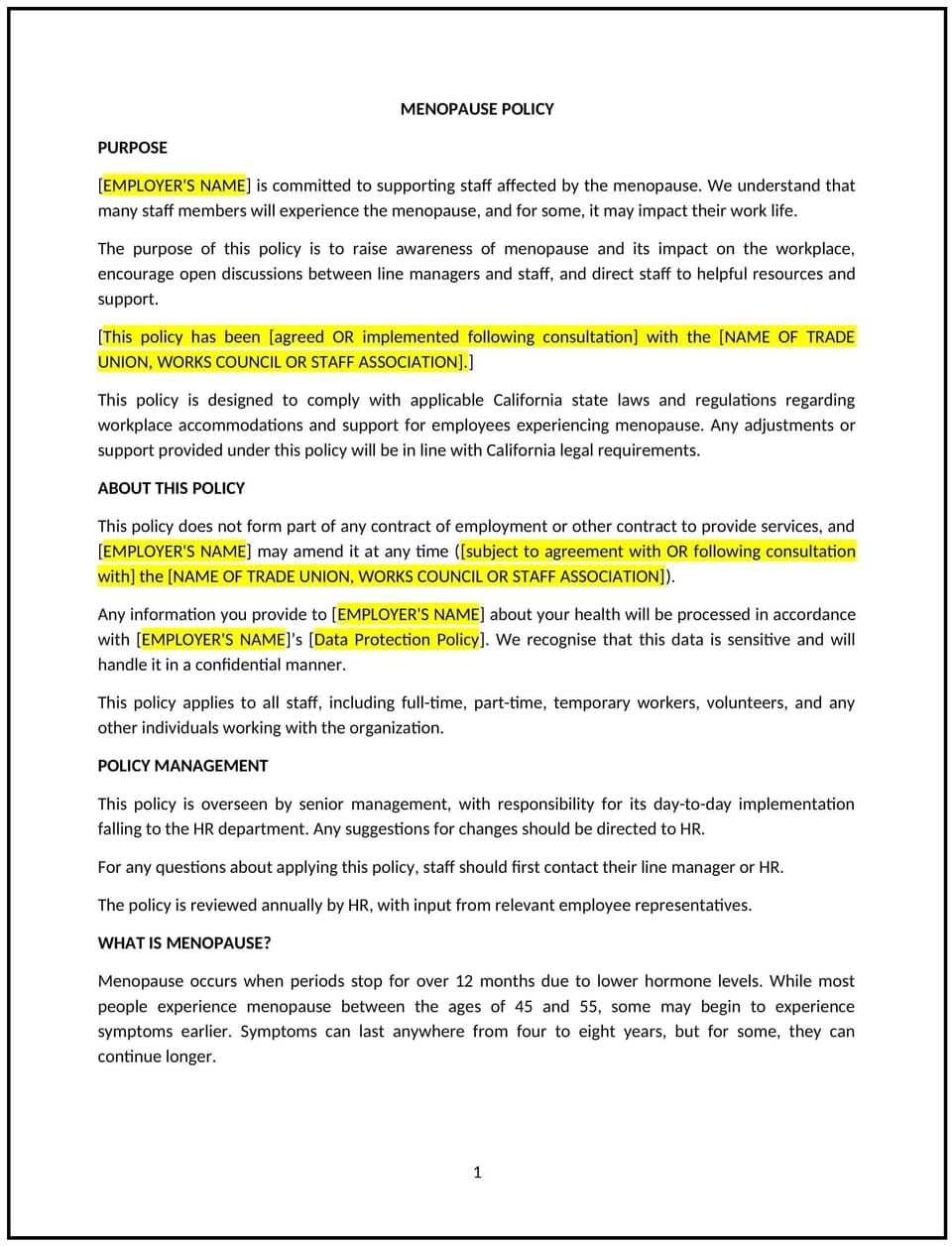Menopause policy (California): Free template

Menopause policy (California)
In California, a menopause policy provides businesses with guidelines to support employees experiencing menopause and related symptoms. This policy promotes inclusivity, enhances employee well-being, and supports compliance with California labor laws, such as the Fair Employment and Housing Act (FEHA), which prohibits discrimination based on medical conditions or gender.
This policy outlines accommodations, communication practices, and the business’s commitment to fostering an understanding and supportive workplace. By implementing this policy, California businesses can create a healthier and more inclusive environment.
How to use this menopause policy (California)
- Define support measures: Specify accommodations, such as flexible schedules, temperature control adjustments, or access to rest areas, to assist employees experiencing menopause symptoms.
- Communicate responsibilities: Clarify the role of managers in supporting employees and addressing concerns in a respectful and confidential manner.
- Encourage open dialogue: Promote a workplace culture where employees feel comfortable discussing menopause-related needs with management or HR.
- Address discrimination: Include procedures for reporting and resolving concerns related to menopause discrimination or harassment.
- Train staff: Provide training to managers and employees on menopause awareness and the importance of fostering inclusivity.
Benefits of using this menopause policy (California)
This policy offers several advantages for California businesses:
- Supports compliance: Reflects FEHA and other California regulations that prohibit gender and medical condition-based discrimination.
- Enhances employee well-being: Provides accommodations and resources to support employees experiencing menopause-related challenges.
- Promotes inclusivity: Fosters a workplace culture that respects and values employees at all stages of life.
- Reduces risks: Minimizes potential claims of discrimination or harassment by addressing menopause-related issues proactively.
- Increases productivity: Helps employees manage symptoms effectively, reducing absenteeism and maintaining performance.
Tips for using this menopause policy (California)
- Reflect California-specific laws: Ensure compliance with FEHA and other applicable regulations protecting employees experiencing medical conditions.
- Provide resources: Offer access to information on managing menopause symptoms and available workplace accommodations.
- Train managers: Educate supervisors on recognizing menopause-related concerns and addressing them respectfully and lawfully.
- Maintain confidentiality: Protect the privacy of employees who disclose menopause-related concerns or request accommodations.
- Review regularly: Update the policy to reflect changes in California laws, workplace needs, or best practices for inclusivity.
Q: How does this policy benefit the business?
A: This policy supports compliance with California laws, promotes employee well-being, and fosters a more inclusive and productive workplace.
Q: What accommodations can the business provide under this policy?
A: Accommodations may include flexible schedules, temperature adjustments, access to rest areas, and additional breaks to help employees manage symptoms.
Q: How does this policy support compliance with California laws?
A: The policy reflects FEHA’s protections against discrimination based on medical conditions or gender, ensuring fair treatment of employees.
Q: What steps should employees take to request accommodations for menopause-related concerns?
A: Employees should notify HR or their manager and discuss their needs confidentially to identify suitable accommodations.
Q: How can the business promote inclusivity regarding menopause in the workplace?
A: The business can provide training, encourage open dialogue, and offer resources to support employees experiencing menopause.
This article contains general legal information and does not contain legal advice. Cobrief is not a law firm or a substitute for an attorney or law firm. The law is complex and changes often. For legal advice, please ask a lawyer.


